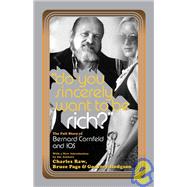
What is included with this book?
CHARLES RAW was financial editor of The Sunday Times (London) when this book was written. BRUCE PAGE, then executive features editor at The Sunday Times, was coauthor of two other bestselling "Insight" books. GODFREY HODGSON was a Washington correspondent for The Observer (London), where for two years he wrote the financial column "Mammon," and was foreign features editor of The Sunday Times. He also coauthored, with Page, American Melodrama: The Presidential Campaign of 1968.
| Preface to the 2005 Edition | x | ||||
| Acknowledgments | xxi | ||||
|
1 | (16) | |||
|
|||||
|
17 | (14) | |||
|
|||||
|
31 | (23) | |||
|
|||||
|
54 | (27) | |||
|
|||||
|
81 | (13) | |||
|
|||||
|
94 | (18) | |||
|
|||||
|
112 | (17) | |||
|
|||||
|
129 | (35) | |||
|
|||||
|
164 | (21) | |||
|
|||||
| 10. A Little Question in Switzerland | 185 | (11) | |||
|
|||||
| 11. Pacem in Terris...and Good Will to All Men | 196 | (19) | |||
|
|||||
| 12. Reminiscences of the Court of the Emperor Cornfeld | 215 | (22) | |||
|
|||||
| 13. The Off-White Cliffs of Dover | 237 | (17) | |||
|
|||||
| 14. Germany: The Super-Super-Supermen | 254 | (24) | |||
|
|||||
| 15. The Bella Figura of Harvey Felberbaum | 278 | (21) | |||
|
|||||
| 16. Good Evening, Comrade Prospect! | 299 | (14) | |||
|
|||||
| 17. The Master Financiers | 313 | (37) | |||
|
|||||
| 18. A Very Long Way Offshore | 350 | (37) | |||
|
|||||
| 19. John M. King: The Power of Natural Gas | 387 | (45) | |||
|
|||||
| 20. The Book of Revelations | 432 | (26) | |||
|
|||||
| 21. The Feeling of the Meeting | 458 | (31) | |||
|
|||||
| 22. Terminating Bernie | 489 | (19) | |||
|
|||||
| 23. The Customers' Yachts | 508 | (20) | |||
|
|||||
| 24. A Game of Strategic Withdrawal | 528 | (15) | |||
|
|||||
| Index | 543 |
The New copy of this book will include any supplemental materials advertised. Please check the title of the book to determine if it should include any access cards, study guides, lab manuals, CDs, etc.
The Used, Rental and eBook copies of this book are not guaranteed to include any supplemental materials. Typically, only the book itself is included. This is true even if the title states it includes any access cards, study guides, lab manuals, CDs, etc.
Excerpted from Do You Sincerely Want to Be Rich?: The Full Story of Bernard Cornfeld and I. O. S. by Charles Raw, Bruce Page, Godfrey Hodgson
All rights reserved by the original copyright owners. Excerpts are provided for display purposes only and may not be reproduced, reprinted or distributed without the written permission of the publisher.